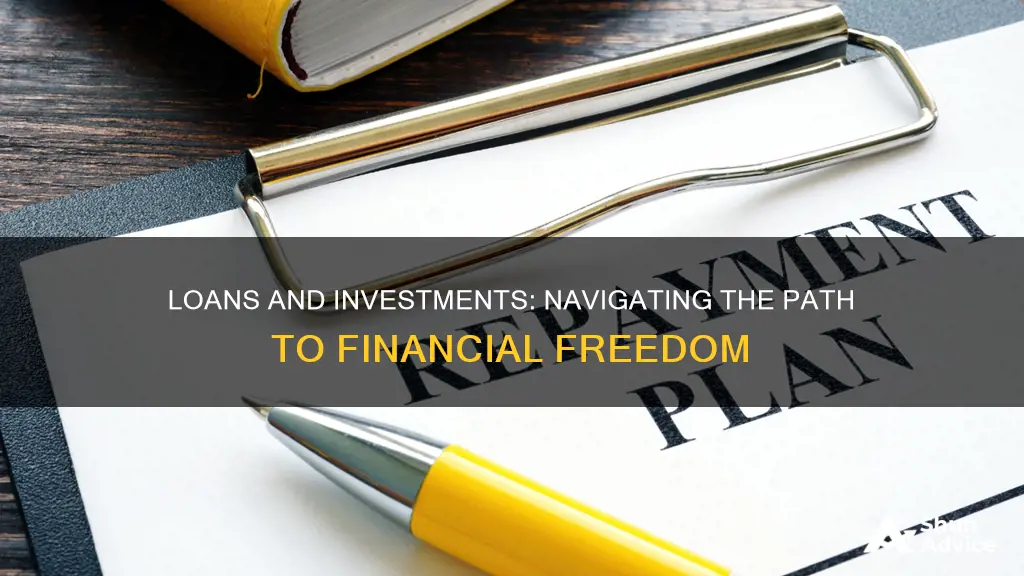
Whether to pay off loans or invest is a common dilemma, and the answer depends on your financial situation and goals. Paying off loans first can reduce monthly expenses, improve your credit score, and remove the unpredictability of paying more interest on variable rate loans. However, it may limit your opportunity to make money on those funds. On the other hand, investing offers the potential for higher returns and liquidity, but it also carries higher risks and may not be suitable if you dislike the idea of constant debt.
| Characteristics | Values |
|---|---|
| Interest rate | The higher the interest rate, the more you pay. |
| Balance total | The total amount of money that still needs to be repaid on a loan. |
| Type | Revolving debt could hurt your credit score more than installment debt if you have a high credit utilization rate. |
| Risk tolerance | If you have a low risk tolerance, it may be better to pay off debt first. |
| Investment opportunities | If you have good investment opportunities, investing may be a better option. |
| Personal financial goals | This may influence whether you choose to pay off debt or invest. |
What You'll Learn

Pay off high-interest debt first
Paying off high-interest debt before investing is a common strategy that financial planners often recommend. Here are some reasons why you may want to consider this approach:
Reducing Interest Payments
High-interest debt, such as credit card debt, can be costly over time and challenging to pay off. By tackling it first, you could save hundreds or even thousands of dollars in interest. For example, consider a $10,000 credit card balance at 17% interest. If you pay $500 a month, you will pay off the debt in 24 months and incur approximately $1,842 in interest charges. However, if you reduce your monthly payment to $250, it will take 60 months to clear the balance, and you will pay $4,862 in interest.
Improved Cash Flow
Once you have paid off your high-interest debt, you may find that you have more money in your budget to save and invest. This extra cash can be used to build an emergency fund, contribute to a retirement plan, or invest in the stock market.
Credit Score Improvement
Reducing debt can improve your credit score, which is crucial if you want to buy a home, take out other loans, or make large purchases in the future. Paying off debt demonstrates that you are creditworthy and can make timely payments as agreed.
Peace of Mind
Escaping high-interest debt can provide a mental and emotional boost, lifting a weight off your shoulders. Waiting to pay off debt means carrying that burden longer, and you will also rack up more interest charges.
Lower Monthly Expenses
Paying off high-interest loans or credit cards can reduce your monthly expenses, freeing up money that can be used for other financial goals or investments.
Removing Unpredictability
If you have a variable interest rate loan, paying it off removes the unpredictability of paying more interest if rates increase. This provides stability and makes it easier to plan your finances.
Depression-Era Investments: Where Money Went
You may want to see also

Advantages of paying off loans before investing
Paying off loans before investing has several advantages. Firstly, it reduces your monthly expenses and leaves more money in your budget for savings or investments. This can be particularly beneficial if you are struggling to cover your basic living expenses due to debt repayments. Secondly, paying off loans can improve your credit score, which is crucial if you want to buy a home, finance a vehicle, or take out future loans. A good credit score can also impact other aspects of your life, such as insurance premiums and employment opportunities.
Another benefit of paying off loans first is the reduction of interest charges. The longer you wait to pay off your debt, the more interest you will accrue, especially with high-interest loans. By clearing your debt sooner, you can save a significant amount of money in interest payments. This is often a better return on your money than investing, as credit card interest rates can be very high, often exceeding the rate of return on average investments.
Paying off loans can also provide peace of mind and reduce the mental and emotional burden of debt. Escaping credit card or loan payments can be a weight off your shoulders, improving your financial and mental well-being. Finally, paying off loans can help you build equity in your home, which can be leveraged for refinancing or home improvement loans.
EPZ Investments: Why People Take the Risk
You may want to see also

Pros and cons of investing
Investing can be a great way to build wealth, but it's not without its risks. Here are some pros and cons to consider when deciding whether to invest or pay off loans first:
Pros of Investing:
- Building Wealth: Investing in the stock market can help you build massive wealth over time. Historically, the stock market has averaged annual gains close to 10%, with some years seeing even higher returns.
- No Expertise Needed: You don't need a degree in finance to invest successfully. Low-fee, broad-market index funds or exchange-traded funds (ETFs) that track a stock market index can be a great way to get started without needing to become a stock market expert.
- Diversification: By investing in different types of assets (stocks, bonds, commodities, etc.), across different sectors and geographies, you can reduce your investment risk. If one type of investment performs poorly, your entire portfolio won't be affected as long as you have a well-diversified portfolio.
- Staying Ahead of Inflation: Investing in stocks can help you stay ahead of inflation and grow your assets. Historically, stocks have yielded higher returns than the average annual inflation rate, helping investors maintain their purchasing power.
- Liquidity: Stocks offer liquidity, meaning you can buy or sell them on any weekday. This is in contrast to other investments like real estate, which can take weeks or longer to sell.
Cons of Investing:
- Risk of Loss: While stocks have historically delivered generous returns over time, there is always the possibility of loss. The stock market can be volatile, with corrections and crashes occurring regularly. If a company performs poorly, its stock price can plummet, resulting in losses for investors.
- Time and Research: Investing in individual stocks requires time and effort to research and monitor companies and the stock market. You need to learn how to read financial statements, annual reports, and follow industry news to make informed investment decisions.
- Taxes: Profits from selling stocks are subject to capital gains taxes. While losing money on stocks can sometimes result in tax breaks, overall, taxes can eat into your investment profits.
- Emotional Rollercoaster: The constant fluctuations in stock prices can lead to emotional ups and downs for investors. It can be challenging to resist the urge to buy or sell at the wrong time due to fear or greed.
- Competition: Institutional investors and professional traders have more time, knowledge, and sophisticated tools at their disposal. As an individual investor, you may feel like you're at a disadvantage when competing against these professionals.
In summary, investing offers the potential for significant wealth accumulation, but it also comes with risks and challenges. It's important to carefully consider your financial situation, risk tolerance, and investment goals before deciding whether to invest or pay off loans first.
Apple Investors: Who's Involved?
You may want to see also

How to decide between paying off debt and investing
It can be a difficult decision to choose between paying off debt and investing, as both are important financial goals. There are several factors and strategies to consider when deciding which option to prioritise. Here are some key points to help you make an informed decision:
Factors to Consider:
- Interest rates and debt type: Focus on paying off debts with higher or variable interest rates first, especially if they are higher than average investment returns. Credit card interest rates, for instance, often exceed 25%, making it a priority for many.
- Financial goals: Assess your overall financial picture and goals. If you have short-term financial goals, such as buying a house or improving your credit score, paying off debt may be more advantageous.
- Risk tolerance: Consider your risk tolerance when deciding between paying off debt or investing. Investing in the stock market carries more risk but can offer higher returns over time.
- Tax implications: Certain types of debt, like student loan and mortgage interest, may offer tax incentives or deductions. Weighing these tax benefits against potential investment returns can influence your decision.
- Emotional factors: The emotional weight of debt can be significant. If the stress of debt is impacting your peace of mind, you may prioritise paying it off sooner, even if the math suggests otherwise.
Strategies for Paying Off Debt:
- Highest interest first ("Avalanche Method"): This strategy focuses on paying off debts with the highest interest rates first while making minimum payments on others. This saves you money in interest charges over time.
- Smallest debt first ("Snowball Method"): This approach involves paying off smaller loans first and gradually tackling larger ones. This method provides a sense of progress and motivation in your debt repayment journey.
- Debt Snowflake Method: This strategy combines the previous two methods, allowing you to pay off debts with the highest interest or smallest balances first. It also considers the impact of debt on your credit score.
- Consolidate your debt: Debt consolidation allows you to combine multiple debts into a single monthly payment, making it easier to manage. Options include debt consolidation loans, balance transfer credit cards, and home equity loans or lines of credit.
Remember, everyone's financial situation is unique, so be sure to assess your budget, financial goals, and risk tolerance before deciding between paying off debt and investing. Consider seeking advice from a financial professional to help you make a decision that aligns with your specific circumstances.
Restaurant Owners: Strategies to Repay Investors When Profits Are Elusive
You may want to see also

Strategies for paying off multiple debts
There are several strategies for paying off multiple debts. Here are some options to consider:
- Prioritize debts with the highest interest rate: This strategy, known as the avalanche method, involves focusing on paying off the debt with the highest interest rate first while continuing to make the minimum payments on all other debts. By tackling the debt with the highest interest rate, you can reduce the overall amount of interest you pay over time.
- Prioritize debts with the smallest balance: This approach is called the snowball method and involves paying off the smallest debts first while still making minimum payments on larger debts. This method can help build motivation as you quickly eliminate individual debts. However, if your larger debts have higher interest rates, this approach may cost you more in total interest over time.
- Debt consolidation: Debt consolidation allows you to combine multiple debts into a single new debt with a lower interest rate. This can simplify your repayment process and potentially reduce the total cost of borrowing. However, be cautious of introductory interest rates that may increase significantly after a certain period, as well as balance transfer fees and other upfront costs.
- Pay more than the minimum: Paying more than the minimum amount each month can help you save on interest and repay your debts faster. Check the terms of your loan to understand any additional fees or prepayment penalties that may apply.
- Pay more frequently: Paying your bills more often, such as twice a month instead of once, can help you stay on top of your debt and lower your balance/utilisation ratio, which is a component used by credit reporting agencies to calculate your credit score.
- Refinancing: Refinancing your debt to a shorter term can help you pay it off faster and reduce the total cost of borrowing. You may be able to qualify for a lower interest rate or a shorter loan term, but keep in mind that shortening the term of your loan could result in higher monthly payments.
It's important to assess your financial situation, interest rates, and personal goals when deciding which strategy to use. Additionally, consider seeking advice from a financial professional to create a long-term financial plan that aligns with your goals and risk tolerance.
Paying for Investment Advice: Is It Worth the Cost?
You may want to see also
Frequently asked questions
Paying off loans before investing can reduce your monthly expenses, improve your credit score, and remove the unpredictability of paying more interest if you have a variable interest rate loan.
Paying off loans before investing can limit your opportunity to make money on those funds.
Investing before paying off loans can allow you to take advantage of the benefits of compounding interest.
If you invest before paying off high-interest debt, it may cost you more in the long run.
There are several strategies for paying off debt, including the "avalanche method" (paying off the highest-interest debt first), the "snowball method" (paying off the smallest debt first), and the "snowflake method" (a balance between the two).







